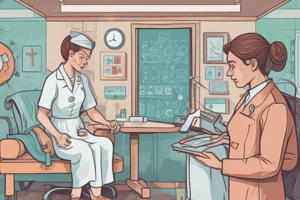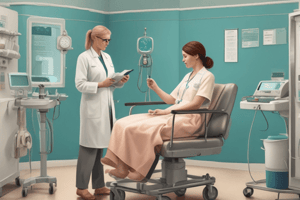Podcast
Questions and Answers
What was the profession of physicians in Ancient Egypt?
What was the profession of physicians in Ancient Egypt?
- Farmers
- Priests (correct)
- Scribes
- Soldiers
What medical treatment was commonly used by Ancient Egyptians?
What medical treatment was commonly used by Ancient Egyptians?
- Herbal baths
- Acupuncture
- Bloodletting (correct)
- Aromatherapy
During what time period did the Ancient Egyptians predominantly practice bloodletting?
During what time period did the Ancient Egyptians predominantly practice bloodletting?
- 1000 BC - 500 BC
- 400 AD - 800 AD
- 1500 AD - 1700 AD
- 3000 BC - 300 BC (correct)
Which group in Ancient Egypt primarily used bloodletting as a medical treatment?
Which group in Ancient Egypt primarily used bloodletting as a medical treatment?
What was the dual role of Ancient Egyptian physicians?
What was the dual role of Ancient Egyptian physicians?
What is the main purpose of Medicaid?
What is the main purpose of Medicaid?
Who funds Medicaid?
Who funds Medicaid?
Who is eligible for Medicaid assistance?
Who is eligible for Medicaid assistance?
Which population group does Medicaid primarily serve?
Which population group does Medicaid primarily serve?
What type of program is Medicaid?
What type of program is Medicaid?
What are some of the forces responsible for the changes in health care delivery and nursing?
What are some of the forces responsible for the changes in health care delivery and nursing?
In which centuries did the societal, economic, technologic, scientific, and political forces evolve?
In which centuries did the societal, economic, technologic, scientific, and political forces evolve?
Which type of force has not played a significant role in the changes in health care delivery and nursing?
Which type of force has not played a significant role in the changes in health care delivery and nursing?
Which forces from the list have had a direct impact on nursing practice?
Which forces from the list have had a direct impact on nursing practice?
What are some of the key drivers of change in health care delivery throughout history?
What are some of the key drivers of change in health care delivery throughout history?
Which factor can influence access to care based on the information provided?
Which factor can influence access to care based on the information provided?
In addition to race, which other factor mentioned can affect access to care?
In addition to race, which other factor mentioned can affect access to care?
Which of the following is NOT mentioned as a factor influencing access to care?
Which of the following is NOT mentioned as a factor influencing access to care?
Based on the information provided, which factor is unlikely to affect access to care?
Based on the information provided, which factor is unlikely to affect access to care?
Which demographic characteristic plays a role in varying access to care as per the text?
Which demographic characteristic plays a role in varying access to care as per the text?
Why are uninsured people more likely to have poor health status?
Why are uninsured people more likely to have poor health status?
What is a consequence of uninsured individuals being less likely to receive medical care?
What is a consequence of uninsured individuals being less likely to receive medical care?
How does being uninsured affect the likelihood of being diagnosed later?
How does being uninsured affect the likelihood of being diagnosed later?
Which factor contributes to uninsured people having poor health status?
Which factor contributes to uninsured people having poor health status?
In what way does lack of insurance affect the medical care received by uninsured individuals?
In what way does lack of insurance affect the medical care received by uninsured individuals?
Flashcards are hidden until you start studying




